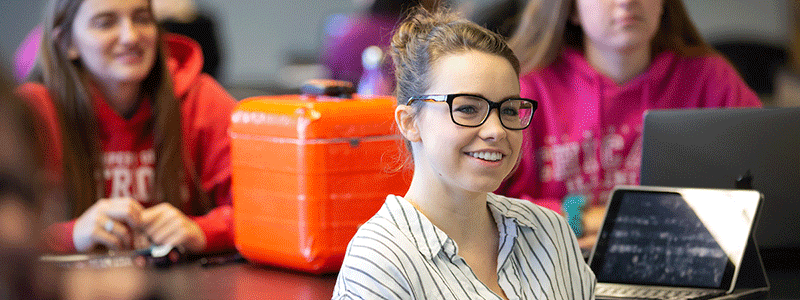
One of the most important ways for your children to stay safe is to develop assertiveness. Whether it’s related to being assertive and standing firm in their plans for how to deal with being offered alcohol or in how much they’ll drink, assertiveness will help minimize the risks they’ll have.
College students often drink not because they have been pressured by their friends into drinking, but rather because they think everyone is doing it and that it’s an appropriate thing to do. Talk to your student about how assertive they are now with their peers and how they can strengthen that assertiveness.
Situations Where Assertiveness Is Important
Certain situations can be more challenging than others. Discuss how they would react in the following scenarios, and how they can safely navigate challenging situations:
| Examples of Situations |
|
Your student is at an activity with friends. The host had not planned on serving alcohol, but someone else brought it. |
|
Your student is pressured into driving while drunk or under the influence of marijuana, or pressured into getting in a car with someone who is under the influence of alcohol or drugs. |
|
The designated driver for the group doesn't do his job and drinks at the party but says he's sober enough to drive. Your student feels pressure to ride with them. |
|
Your student goes to a party where alcohol is present. Your student is offered a drink but refuses. Their friends start teasing them about "needing to get used to college" or "needing to grow up." |
|
Your student is at a party and people pressure them to drink more than planned or wanted, or to try marijuana. |
|
Your student's fraternity brothers try to pressure him into participating in a hazing ritual. |
It’s very important to have open communication with your children so they feel like they can talk to you about their difficulties and successes.
However, open communication will not ensure that you get the opportunity to talk to them about alcohol and marijuana. Only direct conversations will give them the skills they need.
Your input about risks and strategies coupled with your understanding of their beliefs will act as important protective factors throughout their college experience.
There are a few keys to successful communication, but none of them alone can accomplish the goal of helping your student navigate the risks associated with alcohol and marijuana at college. Only you know your student's strengths and which skills they need to work on.
Your input can truly make a difference, especially if it is founded on accurate information that is effectively communicated and builds upon a healthy relationship.